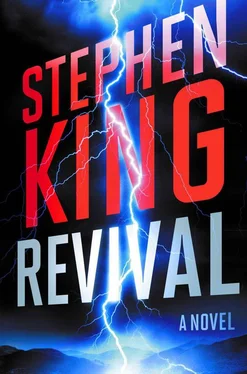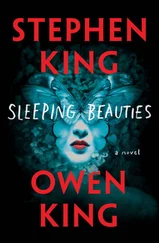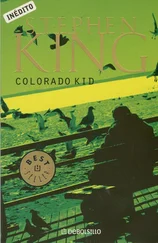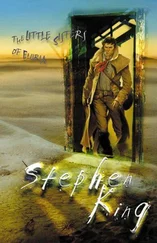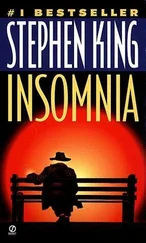That is not dead which can eternal lie,
And with strange aeons, even death may die.
—H. P. Lovecraft
This book is for some of the people who built my house:
Mary Shelley
Bram Stoker
H. P. Lovecraft
Clark Ashton Smith
Donald Wandrei
Fritz Leiber
August Derleth
Shirley Jackson
Robert Bloch
Peter Straub
And ARTHUR MACHEN, whose short novel The Great God Pan has haunted me all my life.
Fifth Business. Skull Mountain. Peaceable Lake.
In one way, at least, our lives really are like movies. The main cast consists of your family and friends. The supporting cast is made up of neighbors, co-workers, teachers, and daily acquaintances. There are also bit players: the supermarket checkout girl with the pretty smile, the friendly bartender at the local watering hole, the guys you work out with at the gym three days a week. And there are thousands of extras—those people who flow through every life like water through a sieve, seen once and never again. The teenager browsing graphic novels at Barnes & Noble, the one you had to slip past (murmuring “Excuse me”) in order to get to the magazines. The woman in the next lane at a stoplight, taking a moment to freshen her lipstick. The mother wiping ice cream off her toddler’s face in a roadside restaurant where you stopped for a quick bite. The vendor who sold you a bag of peanuts at a baseball game.
But sometimes a person who fits none of these categories comes into your life. This is the joker who pops out of the deck at odd intervals over the years, often during a moment of crisis. In the movies this sort of character is known as the fifth business, or the change agent. When he turns up in a film, you know he’s there because the screenwriter put him there. But who is screenwriting our lives? Fate or coincidence? I want to believe it’s the latter. I want that with all my heart and soul. When I think of Charles Jacobs—my fifth business, my change agent, my nemesis—I can’t bear to believe his presence in my life had anything to do with fate. It would mean that all these terrible things—these horrors —were meant to happen. If that is so, then there is no such thing as light, and our belief in it is a foolish illusion. If that is so, we live in darkness like animals in a burrow, or ants deep in their hill.
And not alone.
• • •
Claire gave me an armyfor my sixth birthday, and on a Saturday in October of 1962 I was gearing up for a major battle.
I came from a big family—four boys, one girl—and as the youngest I always got lots of presents. Claire always gave the best ones. I don’t know if it was because she was the eldest, because she was the only girl, or both. But of all the awesome presents she gave me over the years, that army was by far the best. There were two hundred green plastic soldiers, some with rifles, some with machine guns, a dozen welded to tubelike gadgets she said were mortars. There were also eight trucks and twelve jeeps. Perhaps the coolest thing about the army was the box it came in, a cardboard footlocker in camouflage shades of green and brown, with PROPERTY OF U.S. ARMY stenciled on the front. Below this, Claire had added her own stenciling: JAMIE MORTON, COMMANDER.
That was me.
“I saw an ad for them in the back of one of Terry’s comic books,” she said when I was done screaming with delight. “He didn’t want me to cut it out because he’s a booger—”
“That’s right,” Terry said. He was eight. “I’m a big brother booger.” He made a fork with his first two fingers and plugged his nostrils with them.
“Stop it,” our mother said. “No sibling rivalry on birthdays, please and thank you. Terry, take your fingers out of your nose.”
“Anyway,” Claire said, “I copied the coupon and sent it in. I was afraid it might not come in time, but it did. I’m glad you like it.” And she kissed me on the temple. She always kissed me there. All these years later, I can still feel those soft kisses.
“I love it!” I said, holding the footlocker against my chest. “I’ll love it forever!”
This was after breakfast, which had been blueberry pancakes and bacon, my favorite. We all got our favorite meals on our birthdays, and the presents always came after breakfast, there in the kitchen with its woodstove and long table and our hulk of a washing machine, which was always breaking down.
“Forever for Jamie is, like, five days,” Con said. He was ten, slender (although he bulked up later), and of a scientific bent, even then.
“Nice one, Conrad,” our father said. He was dressed for work in a clean coverall with his name—RICHARD—stitched in gold thread on the left breast pocket. On the right breast it said MORTON FUEL OIL. “I’m impressed.”
“Thanks, Daddy-O.”
“Your silver tongue wins you the opportunity to help your mother clean up breakfast.”
“It’s Andy’s turn!”
“It was Andy’s turn,” Dad said, pouring syrup on the last pancake. “Grab a dishtowel, Silver Tongue. And try not to break anything.”
“You spoil him rotten,” Con said, but he grabbed a dishtowel.
Connie wasn’t entirely wrong about my concept of forever. Five days later, the Operation game Andy gave me was gathering dust bunnies under my bed (some of the body parts were missing, anyway; Andy got it at the Eureka Grange rummage sale for a quarter). So were the jigsaw puzzles Terry gave me. Con himself gave me a ViewMaster, and that lasted a little longer, but it eventually wound up in my closet, never to be seen again.
From Mom and Dad I got clothes, because my birthday falls near the end of August, and that year I was going into first grade. I found new pants and shirts about as exciting as a TV test pattern, but tried to say thanks with enthusiasm. I imagine they saw through that with no trouble; false enthusiasm does not come easily to six-year-olds… although, sad to say, it’s a skill most of us learn fairly rapidly. In any case, the clothes were washed in the hulk, hung on the clothesline in the side yard, and finally folded away in my bureau drawers. Where, it’s probably needless to add, they were out of sight and mind until September came and it was time to put them on. I remember there was a sweater that was actually pretty cool—it was brown with yellow stripes. When I wore it I pretended I was a superhero called the Human Wasp: evildoers, beware my sting!
• • •
But Con was wrongabout the footlocker with the army inside. I played with those guys day in and day out, usually at the edge of the front yard, where there was a dirt strip between our lawn and Methodist Road, which was itself dirt in those days. With the exception of Route 9 and the two-lane leading to Goat Mountain, where there was a resort for rich people, all the roads in Harlow were dirt back then. I can remember my mother on several occasions weeping about all the dust that got into the house on dry summer days.
Billy Paquette and Al Knowles—my two best friends—played army with me on many afternoons, but on the day Charles Jacobs appeared in my life for the first time, I was on my own. I don’t remember why Billy and Al weren’t with me, but I do remember I was happy to be by myself for a change. For one thing, there was no need to split the army into three divisions. For another—this was more important—I didn’t have to argue with them about whose turn it was to win. In truth, it seemed unfair to me that I should ever have to lose, because they were my soldiers and it was my footlocker.
Читать дальше
